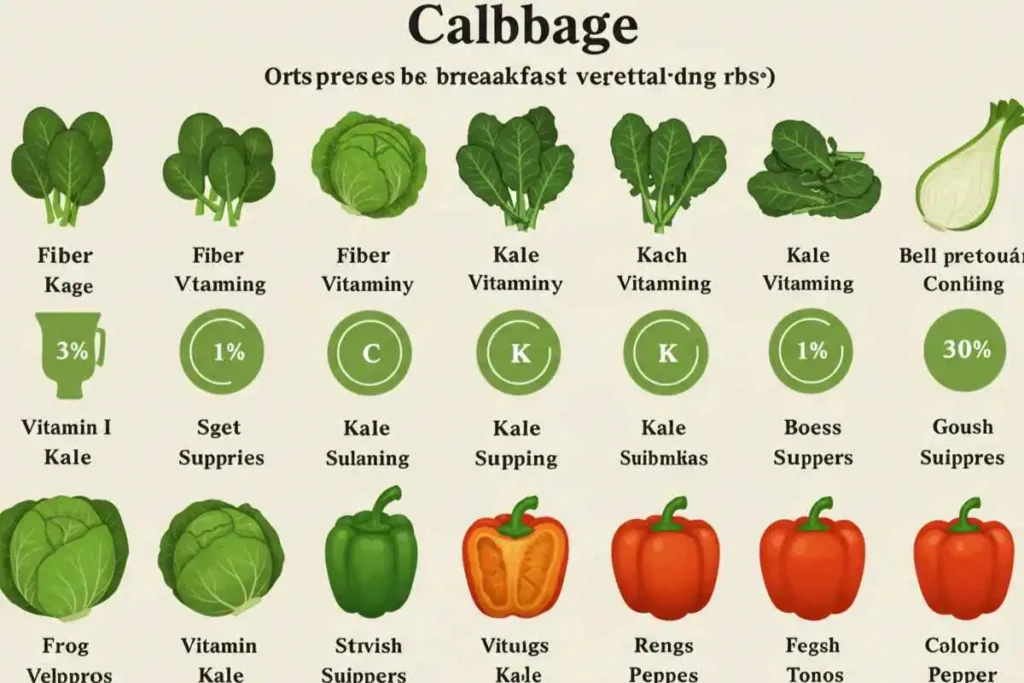1. Introduction
Cabbage may not be the first thing that comes to mind when you think of breakfast, but it’s time to reconsider. This humble vegetable, often associated with soups and salads, packs a powerful punch of nutrients and can be a versatile addition to your morning meal. A nutritious breakfast sets the tone for the day, fueling your body and keeping you energized. In this article, we’ll dive into the health benefits of cabbage, creative ways to include it in your morning routine, and some potential drawbacks to keep in mind.
2. Nutritional Value of Cabbage
Cabbage, a member of the cruciferous vegetable family, is a nutrient-dense food that offers a range of health benefits. Its impressive nutritional profile makes it a worthy candidate for any meal, including breakfast. Let’s take a closer look at what this vegetable has to offer:
2.1. Vitamins and Minerals in Cabbage
Cabbage is a powerhouse of essential nutrients. It’s rich in:
- Vitamin C: Known for boosting immunity and promoting healthy skin.
- Vitamin K: Vital for blood clotting and bone health.
- Vitamin B6: Important for brain health and energy metabolism.
- Potassium: Helps regulate blood pressure and maintain heart health.
In addition, cabbage contains smaller amounts of calcium, magnesium, and iron, all of which contribute to overall well-being.
2.2. Cabbage as a Source of Fiber
A single serving of cabbage offers a significant amount of dietary fiber, which supports digestive health and helps you feel full for longer. Fiber is crucial for maintaining healthy cholesterol levels and stabilizing blood sugar, making cabbage an excellent option for those managing diabetes or aiming to lose weight.
2.3. Comparison with Other Popular Breakfast Vegetables
Cabbage holds its own against other breakfast vegetables like spinach, kale, and bell peppers.

- Calories: Cabbage is low in calories, making it ideal for calorie-conscious individuals.
- Versatility: While spinach and kale are often used in smoothies or omelettes, cabbage’s unique texture and taste make it a perfect addition to wraps, stir-fries, and salads.
By including cabbage in your breakfast, you’re starting your day with a nutrient-packed food that supports overall health.
3. Benefits of Eating Cabbage for Breakfast
Including cabbage in your morning meal offers a host of benefits, from improved digestion to sustained energy. Here’s a detailed look at why cabbage is an excellent choice for breakfast:
3.1. Promotes Digestion and Gut Health
Cabbage is rich in fiber and natural compounds like glucosinolates, which support gut health by encouraging the growth of healthy bacteria. Its high water content also aids in preventing constipation, keeping your digestive system functioning smoothly.
3.2. Low-Calorie, Weight-Friendly Breakfast Option
For those looking to manage their weight, cabbage is a perfect addition to breakfast. With just 25 calories per cup, it provides a filling and satisfying meal without adding unnecessary calories. Its fiber content helps control hunger, reducing the likelihood of overeating later in the day.
3.3. Boosts Immunity
Starting your day with cabbage can help fortify your immune system. The vegetable’s high vitamin C content is a powerful antioxidant that protects your body from harmful free radicals and reduces inflammation.
3.4. Provides Sustained Energy Levels
Cabbage contains complex carbohydrates, which are digested slowly, providing a steady release of energy. This can help you avoid mid-morning energy slumps and maintain focus throughout the day.
4. Creative Ways to Include Cabbage in Breakfast Meals
Incorporating cabbage into your breakfast doesn’t have to be boring! With its mild flavor and crunchy texture, cabbage can be used in a variety of creative and delicious ways:
4.1. Cabbage Slaw in Breakfast Wraps or Sandwiches
Prepare a quick cabbage slaw by mixing shredded cabbage with yogurt, lemon juice, and a pinch of salt. Use it as a filling for wraps or as a topping for breakfast sandwiches for a refreshing crunch.
4.2. Stir-Fried Cabbage with Eggs and Spices
For a protein-rich option, stir-fry cabbage with onions, garlic, and your favorite spices. Add scrambled or fried eggs for a hearty, flavorful dish.
4.3. Cabbage Smoothie Recipes for a Quick Start
Blend cabbage with fruits like apples, bananas, and a splash of orange juice for a nutrient-packed smoothie. The fruit balances the cabbage’s flavor, resulting in a delicious and energizing drink.
4.4. Pancakes and Parathas with Cabbage Filling
For a savory breakfast, stuff whole wheat pancakes or parathas with a spiced cabbage mixture. This can be a satisfying meal that keeps you full for hours.
5. Scientific Evidence Supporting Cabbage for Breakfast
Numerous studies highlight the health benefits of cabbage, reinforcing its status as a superfood:
5.1. Studies on Health Benefits of Cabbage Consumption
Research has shown that regular consumption of cabbage may reduce the risk of chronic diseases like heart disease and diabetes due to its antioxidant properties.
5.2. Research on Cabbage and Digestive Health
Studies indicate that cabbage’s high fiber content supports gut health by promoting regular bowel movements and feeding beneficial gut bacteria.
5.3. Comparative Nutritional Studies
Cabbage has been found to contain more antioxidants than many other vegetables, making it a superior choice for reducing inflammation and supporting overall health.
6. Potential Drawbacks and Considerations
While cabbage offers numerous health benefits, it’s essential to be mindful of potential drawbacks to ensure it aligns with your dietary needs and preferences:
6.1. Potential for Gas and Bloating
Cabbage contains raffinose, a complex sugar that can be difficult for some people to digest. This can lead to gas and bloating, especially if consumed in large quantities.
- Tip: Cooking cabbage thoroughly can reduce its gas-producing effects.
6.2. Not Suitable for Some Diets
Individuals following a low-FODMAP diet to manage irritable bowel syndrome (IBS) may need to limit or avoid cabbage due to its fermentable carbohydrates. These can trigger symptoms like cramping or bloating.
- Alternative: Consider small servings or consult a dietitian to find ways to include cabbage in your diet safely.
6.3. Cooking Methods to Reduce Digestive Discomfort
Raw cabbage is nutrient-rich but may cause more digestive issues than cooked cabbage. Steaming, boiling, or fermenting cabbage not only makes it easier to digest but also enhances its flavor.
7. Cabbage Recipes Perfect for Breakfast
If you’re ready to experiment, these cabbage recipes are sure to become staples in your morning routine:

7.1. Cabbage Omelette Recipe
Ingredients:
- 1 cup shredded cabbage
- 2 eggs
- 1 small onion, finely chopped
- Salt and pepper to taste
Instructions:
- Sauté the onion and cabbage in a pan until soft.
- Whisk the eggs, add salt and pepper, and pour over the cabbage mixture.
- Cook on medium heat until the omelette is set.
7.2. Warm Cabbage Salad with Nuts and Fruits
Ingredients:
- 2 cups shredded cabbage
- Handful of walnuts or almonds
- 1 apple, diced
- Honey and lemon juice for dressing
Instructions:
- Lightly sauté the cabbage.
- Mix with diced apple and nuts.
- Drizzle with honey and lemon juice for a tangy and sweet flavor.
7.3. Crispy Cabbage Fritters
Ingredients:
- 1 cup grated cabbage
- 1/2 cup chickpea flour
- Spices (turmeric, cumin, chili powder)
- Water to form a batter
Instructions:
- Combine all ingredients to form a thick batter.
- Heat oil in a pan and drop spoonfuls of batter to form fritters.
- Cook until golden brown on both sides.
7.4. Cabbage Soup for a Hearty Breakfast
Ingredients:
- 3 cups chopped cabbage
- 1 carrot, diced
- 1 potato, cubed
- Vegetable broth
Instructions:
- Boil all the vegetables in the broth until tender.
- Season with salt, pepper, and herbs.
- Serve hot with a slice of whole-grain bread.
8. Cultural Perspectives on Eating Cabbage for Breakfast
Cabbage is a versatile vegetable enjoyed across various cultures, and its use in breakfast dishes is no exception.

8.1. Asian Cuisines Incorporating Cabbage in Breakfast Dishes
In countries like Japan and Korea, cabbage is commonly used in savory breakfast dishes such as okonomiyaki (savory pancakes) and kimchi, often served with rice and eggs.
8.2. European Breakfast Traditions Featuring Cabbage
In Eastern Europe, fermented cabbage (sauerkraut) is a staple, often served alongside sausages and bread in the morning. This tangy addition adds probiotics and flavor to a hearty breakfast.
8.3. Modern Breakfast Trends with Cabbage-Based Recipes
With the rise of health-conscious eating, cabbage has found its way into contemporary breakfast menus, including smoothie bowls, breakfast tacos, and avocado-cabbage toast.
9. Cabbage in Popular Diet Plans
If you’re following a specific diet, cabbage can fit seamlessly into your meal plan:
9.1. Role of Cabbage in Vegan and Vegetarian Diets
Cabbage provides essential nutrients like iron and vitamin C, which are often needed in plant-based diets. Pair it with lentils or tofu for a complete breakfast meal.
9.2. Keto-Friendly Cabbage Breakfast Ideas
Due to its low carb content, cabbage is an excellent choice for ketogenic diets. Enjoy it in cabbage egg stir-fries or as a substitute for bread in wraps.
9.3. Cabbage in Mediterranean Diets
Cabbage can be incorporated into Mediterranean-inspired breakfasts with olive oil, garlic, and herbs, offering a nutritious start to the day.
10. FAQs
Is it okay to eat cabbage for breakfast?
Yes, eating cabbage for breakfast is not only okay but also highly nutritious. It’s a versatile vegetable packed with vitamins, minerals, and fiber that can enhance your morning meal.
What is the healthiest way to eat cabbage?
The healthiest way to eat cabbage is lightly steamed or sautéed to retain its nutrients while making it easier to digest. Adding minimal oil and spices enhances its flavor without compromising its health benefits.
Is cabbage good or bad for weight loss?
Cabbage is excellent for weight loss. Its low-calorie and high-fiber content keep you full longer, making it easier to control your calorie intake throughout the day.
Is cabbage good or bad for your stomach?
Cabbage is generally good for your stomach as it promotes digestion and supports gut health. However, individuals with sensitive stomachs should avoid eating it raw in large quantities to prevent discomfort.
12. The Unique Properties of Cabbage: What Sets It Apart
Cabbage is more than just a vegetable—it’s a nutritional treasure trove with properties that distinguish it from many other greens.
11. The Unique Properties of Cabbage: What Makes It Special
Cabbage isn’t just an ordinary vegetable—it’s packed with nutrients and benefits that set it apart from many others.
11.1. Packed with Helpful Plant Compounds
Cabbage is full of natural compounds that are good for your body. Some, like sulforaphane and indole-3-carbinol, may help reduce inflammation and even lower the risk of certain diseases. These special compounds are common in cabbage and other similar vegetables, making them great for a healthy diet.
11.2. Works Well in Any Meal
Cabbage isn’t just for lunch or dinner—it’s great for breakfast too. You can enjoy it in warm dishes like stews or in cool, crunchy salads. Its mild taste and versatility make it easy to include in all kinds of meals.
11.3. Helps Keep You Hydrated
Cabbage is made up of about 92% water, which means it can help keep you hydrated. Eating foods with high water content in the morning is a great way to stay refreshed and energized throughout the day.
12. Beyond the Plate: Cabbage as a Symbol of Health
12.1. Historical Uses of Cabbage
Historically, cabbage has been revered for its medicinal properties. Ancient Romans and Greeks believed it could cure ailments ranging from headaches to digestive issues. In modern times, its health benefits have been backed by science, solidifying its reputation as a health-boosting vegetable.

12.2. Environmental Benefits of Choosing Cabbage
Cabbage is an environmentally friendly vegetable, requiring less water and fewer resources to grow compared to many other breakfast staples like grains or dairy products. By incorporating cabbage into your breakfast, you’re making a sustainable choice that aligns with eco-conscious eating.
13. Cabbage’s Role in Preventive Health Care
One of the most compelling reasons to eat cabbage is its ability to support long-term health. Regular consumption has been linked to:
13.1. Reduced Risk of Chronic Diseases
The antioxidants in cabbage, such as polyphenols and flavonoids, help combat oxidative stress, which can contribute to chronic conditions like heart disease and diabetes.
13.2. Improved Bone Health
Cabbage contains calcium and vitamin K, both essential for maintaining strong bones. Including it in your breakfast can help prevent bone density loss as you age.
13.3. Enhanced Mental Clarity
Vitamin B6 in cabbage is essential for producing neurotransmitters like serotonin and dopamine, which regulate mood and cognitive function. Starting your day with cabbage might even boost your mental focus and clarity.
14. Expanding on Breakfast Recipes with Cabbage
To inspire your culinary adventures, here are more innovative ideas for incorporating cabbage into breakfast:
14.1. Cabbage Hash Browns
Upgrade your hash browns by mixing shredded cabbage with grated potatoes, an egg, and spices. Cook until golden brown for a crispy, nutritious twist on a classic breakfast side dish.
14.2. Cabbage and Cheese Quesadilla
Layer shredded cabbage with your favorite cheese and a sprinkle of chili flakes in a tortilla. Toast it on a skillet for a gooey, satisfying breakfast option.
14.3. Fermented Cabbage (Kimchi) Omelette
Add a tangy kick to your omelette by incorporating a spoonful of kimchi. The probiotics in kimchi can promote gut health while elevating the flavor of your meal.
14.4. Cabbage and Lentil Breakfast Bowl
Combine cooked lentils with sautéed cabbage, roasted sweet potatoes, and a drizzle of tahini for a protein-packed, plant-based breakfast.
15. Pairing Cabbage with Other Breakfast Foods
Cabbage pairs beautifully with various other breakfast staples, creating a balanced and harmonious meal:
15.1. Eggs and Cabbage: A Perfect Match
Whether scrambled, poached, or fried, eggs complement cabbage’s texture and mild flavor. For example, a cabbage frittata is both filling and nutrient-rich.
15.2. Whole Grains and Cabbage
Serve sautéed cabbage with quinoa, millet, or whole-grain bread for a fiber-rich breakfast that sustains energy. The combination supports digestive health and keeps you feeling full longer.
15.3. Fruits and Cabbage
If you prefer a sweeter breakfast, pair raw cabbage with fruits like apples, pears, or pomegranate seeds in a refreshing salad. Add a splash of citrus for a zesty flavor profile.
16. Clearing Up Myths About Cabbage
Even though cabbage has many benefits, it sometimes gets an unfair reputation. Let’s tackle a few common myths:
16.1. “Cabbage Is Plain and Uninteresting”
Cabbage doesn’t have to be boring. With the right preparation, it can be full of flavor. You can make savory stir-fries, tangy salads, or even use it in wraps. Adding spices and dressings can take its taste to the next level.
16.2. “Cabbage Always Causes Stomach Problems”
Some people worry that cabbage causes gas or discomfort, but this isn’t true for everyone. Cooking cabbage by steaming or fermenting it makes it easier to digest and reduces the chances of any tummy troubles.
17. Making Cabbage Part of Your Routine
17.1. Start with Small Steps
You don’t have to make big changes right away. Try adding a small amount of shredded cabbage to meals you already enjoy, like omelettes or sandwiches. As you get used to its flavor, you can try more creative recipes.
17.2. Prep Cabbage Ahead of Time
Cabbage is great for meal prep because it stays fresh for a long time. You can chop it in advance and store it in the fridge, ready to add to stir-fries, salads, or wraps when you need a quick meal.
17.3. Try Recipes from Around the World
Explore how other cultures use cabbage in their cooking. For example, you can try Korean kimchi pancakes or Indian stuffed parathas. These recipes can give you fresh ideas and make your breakfasts more exciting.
18. The Growing Popularity of Cabbage for Breakfast
As more people switch to plant-based and eco-friendly diets, cabbage is becoming a popular breakfast ingredient. It’s affordable, easy to find, and packed with nutrition, making it a great choice for families and individuals looking for healthier meals.
Conclusion
Cabbage is more than just an ingredient for salads or soups—it’s a flexible, nutrient-rich vegetable that deserves a spot on your breakfast plate. As we’ve discussed, adding cabbage to your morning meal can improve digestion, help with weight management, boost your immune system, and give you steady energy for the day.
This simple vegetable, full of vitamins, fiber, and antioxidants, is perfect for anyone looking to eat healthier. Whether you prefer it in a stir-fry, a smoothie, or a breakfast wrap, cabbage can make your meals more exciting and nutritious.
Cabbage works well with many diets and cuisines, so it’s easy for everyone to enjoy. From keto to plant-based meals, it fits in effortlessly. Plus, it’s affordable, eco-friendly, and good for both you and the planet.
Don’t let myths about cabbage stop you from enjoying it. With creative recipes and the right cooking methods, you can make it a tasty part of your routine. So, why not try it for breakfast? It might just become your favorite way to start the day.
More Delicious Recipes
Can You Eat Canned Corned Beef Straight from the Can?Expert Guide
15+Irresistible Arabic Breakfast Food Recipes: Easy, Healthy

